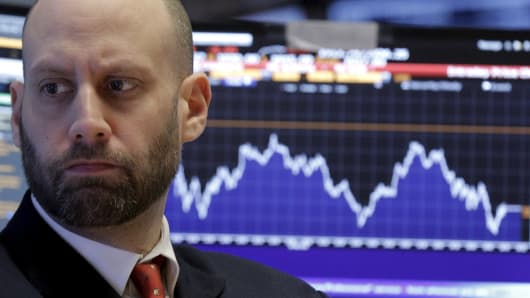What are the chances for a volatility spike before the end of the year?
Tony Dwyer, chief market strategist at Canaccord Genuity and an old friend, stopped by the New York Stock Exchange to talk about those odds.
His conclusion: “Don’t buy spiking volatility in a non-recessionary environment.” In other words, be careful about head fakes — brief spikes that don’t ultimately move markets.
For Dwyer, there are two events that would cause long-term spikes in volatility, which he defines as a VIX over 20 for a long period:
- A risk of recession, and
- The Fed in a concerted rate-hike mode
There’s no recession on the horizon, but he’s sure right about the Fed and volatility. Look what happened this month on just the hint of a rate hike.
The Street has pulled its hair out this quarter, because it counted on volatility. Volatility is the lifeblood of traders. It means more volume, more anxiety, more profits from trading.
But it hasn’t worked out the way the trading community pictured it. By their reckoning, September was going to be a very volatile month. The two catalysts were the Fed meeting and the Clinton-Trump debate. Both were sure to produce fireworks.
Except they didn’t. Neither the Fed nor the debates caused a serious spike in volatility.
The Fed meeting was a particular disappointment for volatility seekers. Even if the Fed didn’t raise rates, the central bank would surely make it clear it would do so in December, they thought. Surely that would spike the VIX.
But it didn’t. At the moment, the markets still assign only a 57 percent chance of a December hike.
But what DID move the markets in September was Boston Fed President Eric Rosengren, a dove, who out of the blue, a few days before the Fed meeting, declared that he saw a strong case for the Fed to raise rates immediately.
Boom. The VIX goes from 12 to 20. The S&P 500 drops 110 points in two days.
No one planned that Rosengren was going to make a comment like that, or that it would have such a big market reaction. That is what you call an “unknown unknown,” in the words of Donald Rumsfeld.
But it highlights Dwyer’s point: Outside of some exogenous shock, the Fed will cause any immediate volatility.
The inability to forecast volatility is not stopping anyone from trying. Now it’s October. Plenty are expecting lots of volatility around the election, but particularly if Trump wins.
Dwyer’s take? A Trump victory could cause a serious spike in volatility, but primarily because Trump has been so personally hostile to Janet Yellen that some have speculated she may resign if Trump wins.
Now, THAT would cause volatility.
So, what’s the bottom line? How do you profit in a low volatility environment, with occasional spikes up in the VIX?
“Your only sustainable alpha is to buy a correction,” Dwyer, a notable bull, insists.
source”cnbc”




